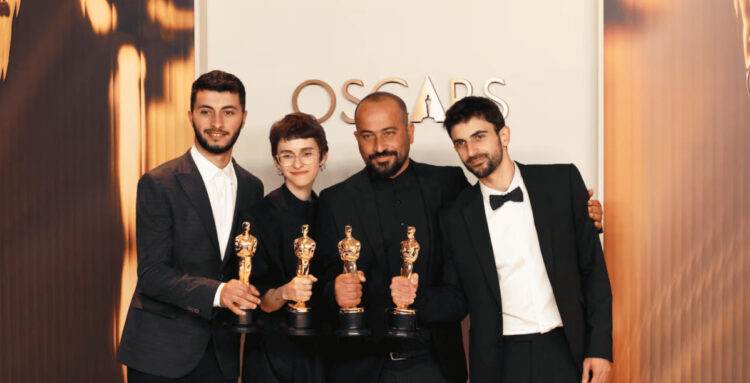No Other Land just made history as the first Palestinian film to win an Oscar for Best Documentary — without even having a US distributor.
The film had already faced roadblocks for its blunt criticism of the Israeli occupation of Palestine.
The film wins an Oscar despite lacking US distribution
The Palestinian-Israeli documentary No Other Land took home the Best Documentary award at the 97th Academy Awards in Los Angeles. It was up against Black Box Diaries, Porcelain War, Soundtrack to a Coup d’Etat, and Sugarcane.
This is the first time a Palestinian film has won in this category. While the film has distribution deals in 24 countries, it still hasn’t secured one in the US.
Co-director Yuval Abraham told Deadline last month, “I believe it’s clear that it’s for political reasons. I hope that it will change.”
A powerful story of resistance and displacement
The documentary follows Palestinian activist Basel Adra as he fights against Israeli forces trying to forcefully remove his community in Masafer Yatta.
Soldiers regularly demolish homes to make way for military training zones. A lot of the footage comes from Adra’s own camcorder, capturing events like the bulldozing of a village school in the occupied West Bank.
The film also features Israeli investigative journalist Yuval Abraham, who builds a friendship with Adra and later co-directs the documentary.
No Other Land highlights the parallel realities in which the two friends live

Abraham’s yellow Israeli number plate lets him travel anywhere, while Adra is confined to a territory that only ever gets smaller for Palestinians.
Under Israeli military law, Adra and millions of other Palestinians face severe restrictions on movement. Meanwhile, Israeli settlers and citizens move freely, highlighting the stark divide between their realities.
But the disparity runs deeper: Abraham lives under civilian law with full rights, while Adra endures military rule, home demolitions, and the constant threat of displacement.
Filming over four years before the Al-Aqsa Flood

Filming took place between 2019 and 2023, before the October 7th Al-Aqsa Flood attack. Some of the footage goes way back to Adra’s childhood, showing his father standing up to Israeli soldiers and settlers trying to take over Palestinian land.
The film’s success at international film festivals

Before winning the Oscar, No Other Land had already made waves in the festival circuit. It won both the Audience Award and the Documentary Film Award at the Berlin International Film Festival (Berlinale) in February 2024.
It also picked up the New York Film Critics Circle award for Best Non-Fiction Film.
Acceptance speech calls for action against injustice
“No Other Land reflects the harsh reality that we have been enduring for decades and still resist as we call on the world to take serious actions to stop the injustice and to stop the ethnic cleansing of the Palestinian people,” said Palestinian filmmaker Basel Adra during his Oscar acceptance speech.
Standing beside his co-director, Yuval Abraham added, “We made this film, Palestinians and Israelis, because together our voices are stronger.
“When I look at Basel, I see my brother but we are unequal. We live in a regime where I am free under civilian law and Basel is under military law that destroys his life and he cannot control.
“There is a different path — a political solution without ethnic supremacy, with national rights for both of our people. And I have to say as I’m here, the foreign policy in this country is helping to block this path.
“And why? Can’t you see that we are intertwined? That my people can be truly safe if Basel’s people are truly free and safe. There is another way. It’s not too late for life, for the living.”
Condemnation in Germany for criticizing the occupation
Back when Adra and Abraham won at Berlinale, their acceptance speech stirred controversy. Abraham pointed out the stark inequality between them: “I am free to move where I want in this land, but Basel, like millions of Palestinians, is locked in the occupied West Bank. This situation of apartheid between us, this inequality, it has to end.”
The comments didn’t sit well with German officials. Some politicians publicly condemned the speech and accused the filmmakers of being “antisemitic.”
Challenges in securing US distribution amid industry censorship
Despite strong critical reception, No Other Land has struggled to find a distributor in the US. Many believe this is due to the entertainment industry’s unwillingness to platform films that openly criticize Israel’s treatment of Palestinians.
Abraham stated, “We decided not to wait on the theatrical release and released it in almost 100 theaters independently.”
Ongoing settler violence and resistance in Masafer Yatta
The film’s controversy has only drawn more attention to the real-life struggle of Masafer Yatta residents. For decades, Israeli authorities have been trying to evict roughly 1,000 Palestinians from the area to create a military “firing zone” for training exercises.
Masafer Yatta sits in Area C of the West Bank, where Israeli settlements — illegal under international law — are scattered throughout. Settlers in the area regularly harass Palestinians, vandalize homes and vehicles, and even attack them.
Israeli and international responses to the film’s message
While Abraham has found support internationally, he’s also seen Israel shift even further to the right.
“There is an Israeli left – it’s not represented politically today and it’s very small and it’s more and more persecuted by the government. The space for criticism really shrunk since 7 October,” he explained.
“The Israeli parties are not willing to show even the most basic level of criticism towards the Israeli army, despite the highest court in the world flagging its military operations for war crimes and crimes against humanity.”
Israeli officials condemn the film’s message

Backlash to the Oscar win has already started in Israel. Miki Zohar, Israel’s Minister of Culture and Sports, slammed the film, calling its success a “sad moment for the world of cinema.”
“Instead of presenting the complexity of Israeli reality, the filmmakers chose to amplify narratives that distort Israel’s image vis-a-vis international audiences,” Zohar wrote on X (formerly Twitter).
“Freedom of expression is an important value, but turning the defamation of Israel into a tool for international promotion is not art – it is sabotage against the State of Israel.”
No Other Land just made history, but its impact is only beginning. This film isn’t just a win — it’s a wake-up call.
















































